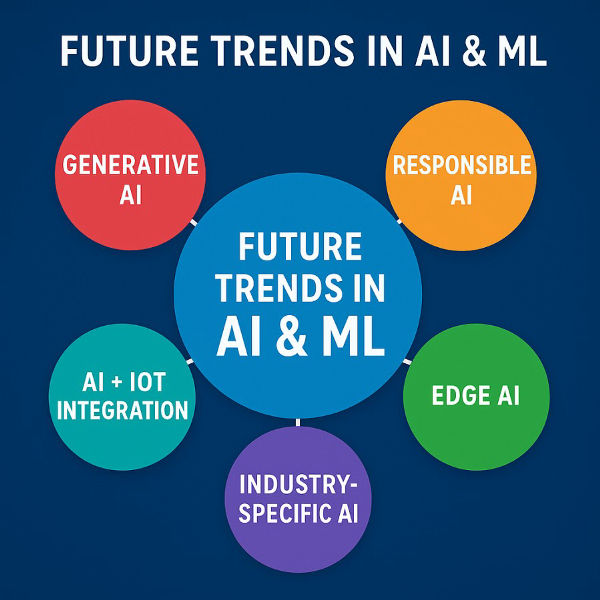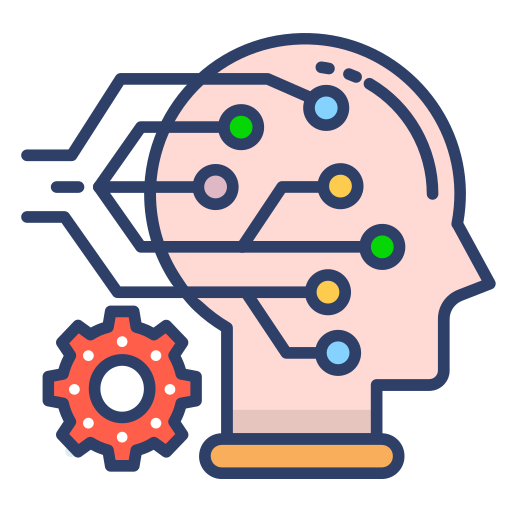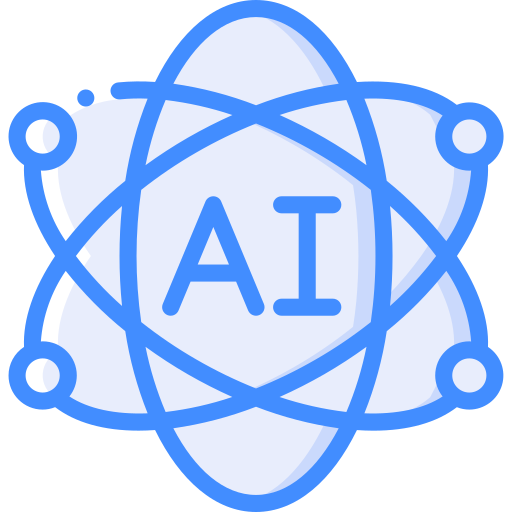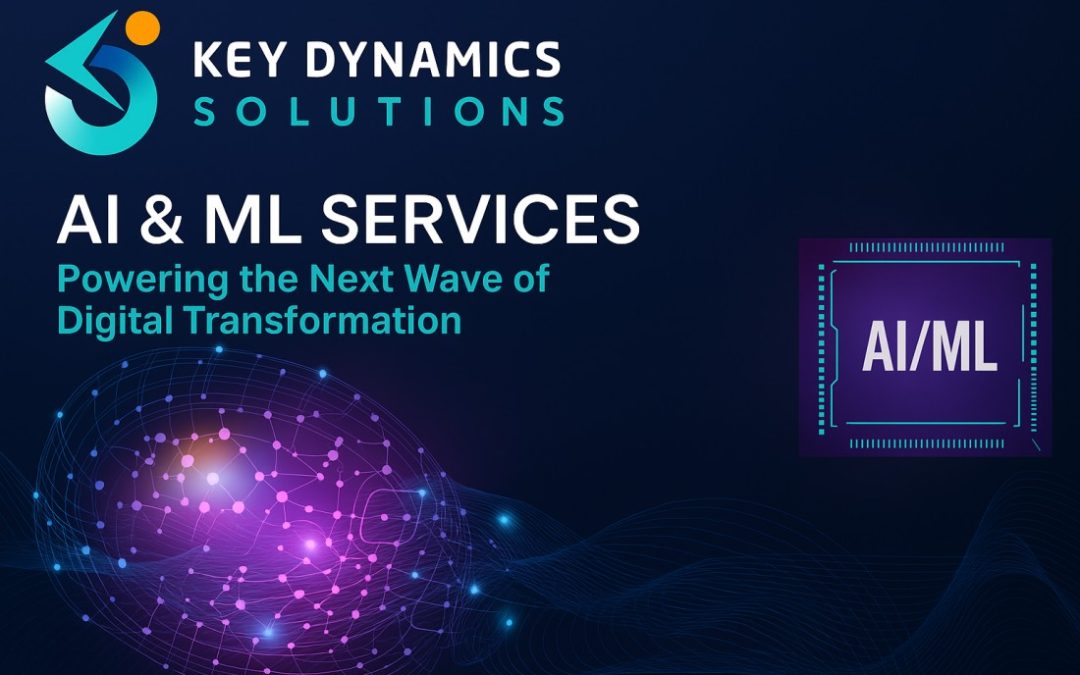Introduction
Artificial intelligence (AI) and machine learning (ML) are no longer futuristic buzzwords—they’re everyday business enablers. From personalized customer experiences to predictive analytics in supply chains, AI & ML services are transforming industries worldwide. Cloud platforms like Azure Machine Learning are making it easier for companies to develop, deploy, and scale intelligent solutions without heavy infrastructure costs.
In this article, we’ll explore what AI & ML really mean for businesses, how machine learning is applied across industries, and why adopting artificial intelligence & machine learning solutions is critical for staying competitive.
Understanding AI & ML
At the simplest level, artificial intelligence refers to systems that mimic human intelligence—reasoning, learning, and decision-making. Machine learning is a subset of AI that uses algorithms and data to “learn” patterns and improve performance over time. Together, AI & ML enable machines to not only process information but also predict outcomes and adapt to changes.
For example:
- An e-commerce platform using machine learning to recommend products.
- A bank using AI & ML services for fraud detection.
- A manufacturer using Azure Machine Learning to predict equipment failures before they occur.
Why Businesses are Turning to AI & ML Services?
The demand for AI & ML adoption has accelerated because of three main factors:
Data Explosion
Businesses are generating massive amounts of data daily. AI & ML services can analyze this data faster than humans ever could, uncovering hidden insights.
Cloud Accessibility
Platforms like Azure Machine Learning provide the infrastructure to build and scale solutions quickly—removing the barrier of costly on-premise hardware.
Competitive Advantage
From personalization to automation, artificial intelligence machine learning allows businesses to improve efficiency, reduce costs, and enhance customer experience.
Key Applications of AI & ML
Businesses across industries are using AI & ML in practical, measurable ways:
- Predictive Analytics: Retailers forecast demand; healthcare providers predict patient outcomes.
- Automation: Finance and HR departments streamline repetitive tasks through AI & ML services.
- Computer Vision: Manufacturing uses machine learning to detect product defects.
- Natural Language Processing (NLP): Customer service bots powered by artificial intelligence machine learning improve response times.
- Supply Chain Optimization: Logistics firms use Azure Machine Learning for smarter routing and inventory planning.
The Role of Azure Machine Learning
One of the most powerful tools available today is Azure Machine Learning, Microsoft’s cloud-based ML platform. It allows businesses to:
- Build models using drag-and-drop or advanced coding.
- Train models with automated ML, reducing the need for deep expertise.
- Deploy solutions at scale across web, mobile, or edge devices.
- Integrate with other Azure services for a unified AI ecosystem.
By leveraging Azure Machine Learning, companies can experiment faster, innovate continuously, and scale globally.
Benefits of Artificial Intelligence & Machine Learning
Organizations investing in AI & ML services gain significant advantages:
- Improved Decision-Making: Data-driven insights replace guesswork.
- Efficiency & Cost Savings: Automation reduces manual workloads.
- Personalization: Customers receive relevant, tailored experiences.
- Scalability: With cloud services like Azure Machine Learning, businesses can expand capabilities easily.
- Risk Reduction: Predictive analytics in machine learning helps identify risks before they impact operations.
Future Trends in AI & ML

Looking ahead, AI & ML will continue to evolve, with trends such as:
- Generative AI: Creating new content, designs, and solutions from trained models.
- Responsible AI: Focus on ethics, bias reduction, and transparency in artificial intelligence machine learning.
- Edge AI: Running AI & ML services directly on devices for real-time decisions.
- Industry-Specific AI: Tailored solutions for healthcare, finance, manufacturing, and retail.
- AI + IoT Integration: Pairing machine learning with connected devices for predictive maintenance and automation.
Conclusion
AI & ML services are no longer optional—they’re essential for businesses that want to innovate and grow. With platforms like Azure Machine Learning, companies can build, train, and deploy intelligent solutions that drive efficiency and improve outcomes.
Whether it’s predictive analytics, automation, or personalization, artificial intelligence machine learning is reshaping industries. Organizations that embrace these technologies today will be better positioned to compete in tomorrow’s digital economy.
Frequently Asked Questions
1. What are AI and ML services, and how can they benefit my business?
AI (Artificial Intelligence) and ML (Machine Learning) services help businesses automate processes, analyze large datasets, and make data-driven decisions. By leveraging AI and ML, companies can improve operational efficiency, enhance customer experiences, reduce costs, and identify new growth opportunities.
2. How do AI and ML drive digital transformation?
AI and ML enable businesses to transform traditional operations into intelligent, automated workflows. They empower organizations to predict trends, personalize customer interactions, optimize supply chains, and innovate faster, creating a competitive edge in the digital landscape.
3. Which industries can benefit most from AI and ML services?
AI and ML have applications across virtually every sector, including healthcare, finance, retail, manufacturing, logistics, and telecom. From predictive maintenance in manufacturing to personalized recommendations in e-commerce, ai machine learning solutions can enhance efficiency and decision-making across industries.
4. What types of AI and ML services are available?
Common AI and ML services include data analysis and visualization, predictive analytics, natural language processing (NLP), computer vision, recommendation systems, chatbots, and automation solutions. Businesses can choose tailored solutions depending on their specific challenges and objectives.
5. How do I get started with AI and ML services for my company?
To get started, businesses should first identify key areas where AI and ML can deliver the most value. Partnering with experienced AI service providers can help in assessing data readiness, choosing the right models, implementing solutions, and scaling AI initiatives for maximum impact.
Read More: How Dynamics 365 Supply Chain Management (D365 SCM) is Transforming Modern Supply Chains

 Logistics
Logistics  Life Science
Life Science  Healthcare
Healthcare Services
Services Manufacturing
Manufacturing  Banking & Finance
Banking & Finance Retail
Retail E-Commerce
E-Commerce Finance
Finance Supply Chain Management
Supply Chain Management Sales
Sales Customer Service
Customer Service Field Service
Field Service Project Operation
Project Operation Marketing
Marketing Human Resources
Human Resources Business Central
Business Central Data Integration
Data Integration Data Warehousing
Data Warehousing Data Analytics
Data Analytics Data Visualization
Data Visualization Data Governance
Data Governance Big Data
Big Data Looker Studio
Looker Studio Power BI
Power BI Power Apps
Power Apps Power Automate
Power Automate Power Virtual Agents
Power Virtual Agents AI Builder
AI Builder Data Machine Learning
Data Machine Learning Prediction & Forecasting
Prediction & Forecasting BOTs & Virtual Agent
BOTs & Virtual Agent Language Services
Language Services Generative AI
Generative AI Agentic AI
Agentic AI iOS & Android Development
iOS & Android Development Cross-Platform Development
Cross-Platform Development UI/UX Design
UI/UX Design App Testing & QA
App Testing & QA Backend Development
Backend Development